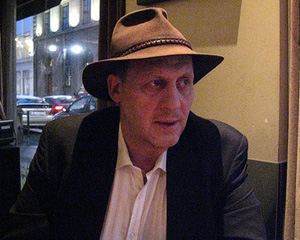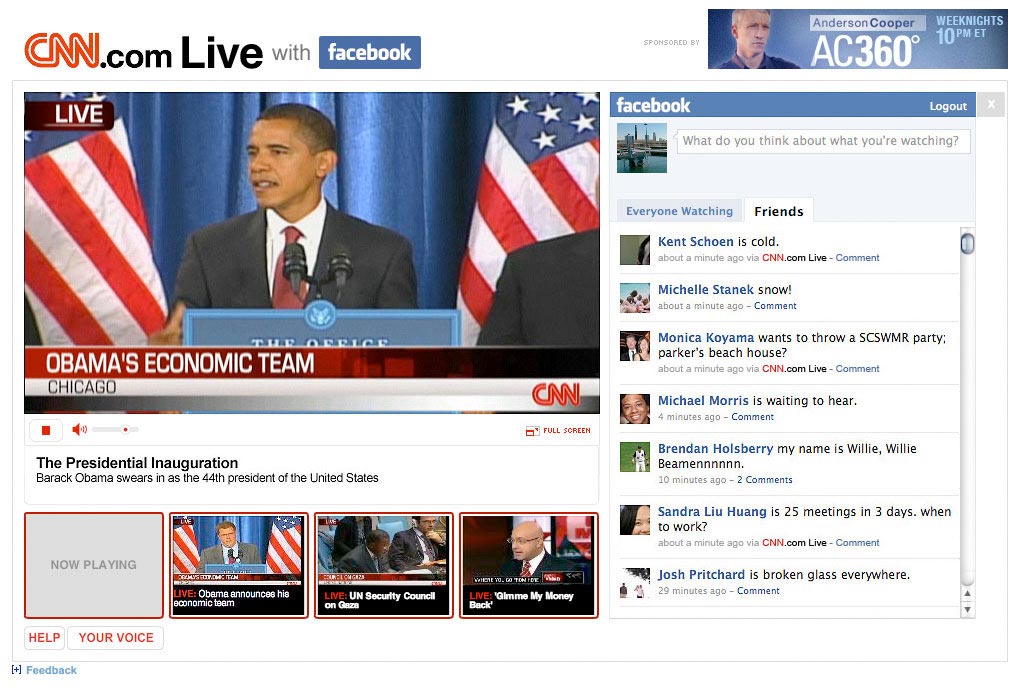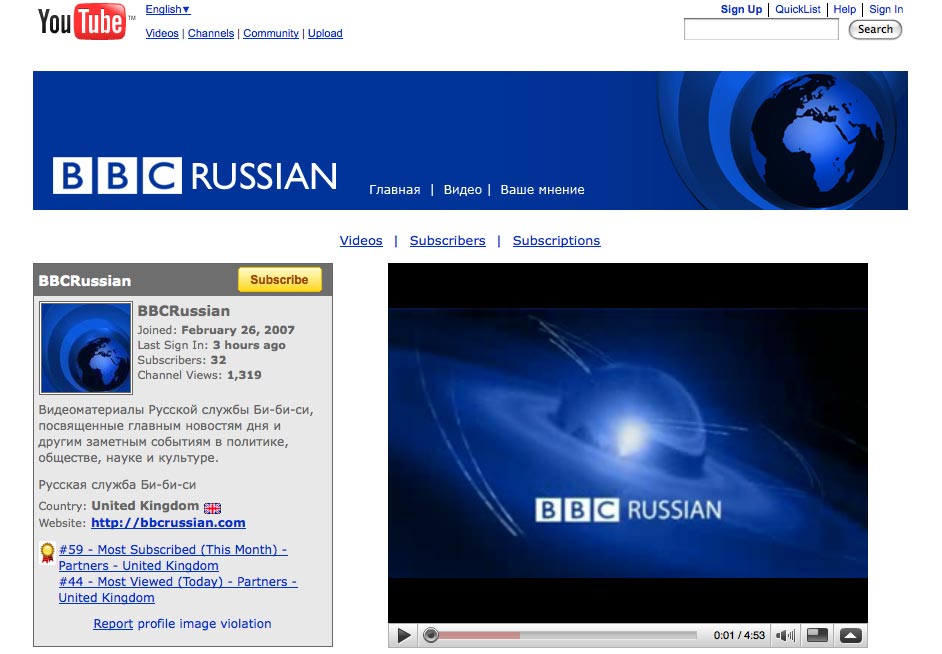Asher Moses of The Age looks at the role of social media such as Twitter, Flickr and Facebook have played during the fatal bushfires that have raged through Victoria in Australia
Tag Archives: Facebook
Did you buy a newspaper yesterday?
It was a bid to help the US’s ailing newspaper industry: Buy A Newspaper Day. It had a Facebook group and everything. Unfortunately, 19,397 people said they weren’t attending. Charity endeavours aside, out of interest, how many Journalism.co.uk readers bought a newspaper yesterday? Vote below:
Online Journalism Scandinavia: Online media play crucial role in Iceland’s fleece revolution
 On Monday, Iceland’s coalition government collapsed under the strain of an escalating economic crisis.
On Monday, Iceland’s coalition government collapsed under the strain of an escalating economic crisis.
However, because of widespread cross-ownership, Icelandic media is not only feeling the impact of the crisis on its advertisement revenues; it’s in the eye of the storm, and angry Icelanders have turned to turn to the web to inform each other, organise anti-government rallies and vent their frustrations.
“It’s a grassroots revolution,” said Andri Sigurðsson, a blogger and web developer.
He explained that Iceland had seen a surge in political blogs in the wake of the financial turmoil, and that people had turned to using web tools such as Facebook and Twitter to organise demonstrations and protests.
With so many people losing their jobs, this year the island is facing the highest unemployment in decades. Some have turned to blogging full time – the blogger behind Newsfrettir, for example, has started translating Icelandic news to English after being made redundant in October.
Since the country’s biggest newspaper, Fréttablaðið, along with a large portion of the rest of Icelandic media, is controlled by Baugur (the ailing investment company that also owns a large stake in Iceland’s and the UK’s retail industry); and the second biggest newspaper, Morgunblaðið, has been controlled by Björgólfur Guðmundsson (owner and chairman of West Ham FC and chairman of Landsbanki, the bank embroiled in the Icesave scandal)… the whole situation gets rather complicated.
 “We’re trying to cut all our connections to Baugur. You know, the sugar daddy behind DV and Fréttablaðið was Baugur, but the sugar daddy behind Morgunbladid was Björgólfur Guðmundsson? Every media here has its problem. We had Baugur’s Jon Asgeir Jóhannesson, they have Björgólfur,” said Reynir Traustasson, editor-in-chief of Icelandic tabloid DV, pictured right.
“We’re trying to cut all our connections to Baugur. You know, the sugar daddy behind DV and Fréttablaðið was Baugur, but the sugar daddy behind Morgunbladid was Björgólfur Guðmundsson? Every media here has its problem. We had Baugur’s Jon Asgeir Jóhannesson, they have Björgólfur,” said Reynir Traustasson, editor-in-chief of Icelandic tabloid DV, pictured right.
It is against this backdrop that political blogs such as the conservative AMX.is and the socialist-green Smugan.is have grown in popularity. However, Fréttablaðið’s editor-in-chief Jón Kaldal, does not see the surge in independent sites for news and opinion as a threat to mainstream media.
“None of these are doing investigative reporting; they are just repeating what has been written elsewhere. It is an outlet for gossip and rumours. But certain internet sites have worked well to get information out of the government. When gossip breaks out on these sites, the government is forced to come out of hiding,” he said.
Yet Kaldal was not optimistic about the times ahead:
“The whole society of Iceland is in a very strange place at the moment. It’s like we’re engulfed in a thick fog, and we don’t know quite how the world will look like when it lifts. Always in a recession or downturn there is a stronger demand for effect in advertisement. The strong grow stronger during a recession. But the situation here on Iceland is so critical that I don’t know if that’s enough.”
Read more about online journalism and the media in Scandinavia at this link.
Images in this post used with the author’s permission. For more of Kristine’s Iceland images visit Flickr.
News Mixer API spawns Iowa Content experiment
News Mixer, the final year project of programming-journalism students at Medill School of Journalism at Northwestern University aimed at breathing new life into commenting systems on news sites, was always intended to be developed and adapted further by third parties.
“We got a lot of the hard work out of the way and the code is out there for anyone to play with (…) it’s free. Use it,” Brian Boyer, one of the developers behind it, insisted in an interview last year.
The open source nature of the project has allowed three developers from e-Me Ventures to create Iowa Content – a WordPress-based widget that aggregates localised news content from a range of sources and is connected to Facebook Connect.
Iowa Content is based on News Mixer’s quip function – short-form responses to news items, ideally suited to Twitter or Facebook status updates.
Being linked with the social network will encourage readers to discuss and comment on the news – as well as share links via their profiles.
It’s in the experimental stage right now, but as the intro video below says, it’s about ‘grassroots creation of meaningful content’:
CNN wins battle of online inauguration broadcasters, according to Omniture stats
Marketing-Interactive reports on stats from Omniture SiteCatalyst that suggest CNN attracted 136 million page views and served a record 21.3 million live video streams on CNN Live, as of 3.30pm (EST) yesterday.
According to the report, CNN Live’s use of Facebook boosted the figures with an estimated 1 million users updating their status on the social network through the CNN site.

A week of innovation from Al Jazeera ends with launch of mobile sites
Media coverage on Al Jazeera English hasn’t always been positive, but since its launch it’s done some interesting things multimedia-wise: launching all its content on YouTube, in April 2007, for example (its English content page can be found here).
More broadly the Al Jazeera network, which includes the Arabic channels, has also not been afraid to try out new technology, with the launch of a ‘citizen-journalism upload portal’ for example.
This week we’ve reported on its video content partnership with the Independent newspaper site. While they’ve tightened up the PR act (no longer in-house, it’s managed by Brown Lloyd James, the same agency that handles press for the Telegraph group) these are newsworthy developments.
Events in Gaza have been a chance for Al Jazeera to experiment and show off its multimedia – through projects showcased at Al Jazeera Labs. Follow Al Jazeera’s head of new media, Mohamed Nanabhay, @Mohamed, on Twitter to find out more.
Particularly exciting is its release of material under a Creative Commons licence, in its 3.0 form – allowing other sites reproduce the broadcaster’s video content as long as they attribute the source.
Today comes further news from the broadcaster: the beta launch of its Arabic and English mobile websites, which will work on any mobile handset with web browsing ability.
“Users only need to bookmark the following web addresses on their mobile, for English news http://m.aljazeera.net/, and for Arabic news http://ma.aljazeera.net/,” a release from the company said.
“The mobile web initiative is one of the key services that is being launched as part of our New Media strategy”, Saeed Othman Bawazir, Al Jazeera’s director of technology, said in the release.
“The aim is to make our content more accessible to new audiences across various new platforms. With the launch of this mobile service, we hope to provide our audience with a customized news browsing experience on the mobile device of their choice,” he said.
This initiative includes ‘delivering video and other content over interactive platforms,’ such as YouTube, Facebook, Twitter, and iTunes, the release said.
‘No, you can’t be friends with the weather presenter’ – the BBC’s policy on Facebook
It’s a post from November 2008, but Journalism.co.uk just spotted this, via the BBC Internet Blog picks. The Shed blog reports that the BBC has an official policy on staff social networking.
When The Shed added Nazaneen Ghaffar as a friend on Facebook it received this e-mail from Andy Smith at the BBC:
“Unfortunately the BBC do not allow Nazaneen to accept friend requests. As an alternative a facebook fan group has been created.”
News sites get social for Obama inauguration
To mark President Elect Barack Obama’s inauguration on January 20, news sites are plotting and planning their online coverage already:
CNN
CNN’s going for the social networking angle, teaming its live video streaming site, CNN.com Live, with Facebook. Users will be able to update their Facebook status from the CNN site and see a stream of updates from their friends.
The updates entered via CNNLive will be tagged with the hyperlink ‘via CNN.com Live’ so Facebook contacts can click through to view the inauguration site from the social network.

NPR
At the end of last year, NPR used its inside blog to put a call out for social media ways to cover the inauguration. Among the ideas mooted in the post were:
- Citizen journalism iPhone app
- ‘Mobcasting’ – audio recordings of voicemails left by listeners about their experiences of inauguration day
- An inauguration #tag – for Twitter, Flickr, blog posts etc. The tag #inaug09 seems to be in use already.
- Maps of user-generated content
More help is wanted from techies and journalists – contact Andy Carvin (@acarvin on Twitter) via the blog post.
YouTube round-up: BBC Russian and Davos videos
 The BBC has made good on its October promise to launch six new video channels on YouTube in Urdu, Spanish, Russian, Persian, Portuguese and Arabic and has rolled out its Russian stream.
The BBC has made good on its October promise to launch six new video channels on YouTube in Urdu, Spanish, Russian, Persian, Portuguese and Arabic and has rolled out its Russian stream.
The BBC Russian YouTube channel will feature footage from BBC Russian correspondents and Russian-language reports on major news events.
The other multi-language channels will be launched between now and early 2009, a press release from the corporation said.
YouTube is getting in on the act again ahead of the World Economic Forum at Davos next month by asking users to send their video answers to the following questions:
Are you confident that global growth will be restored in 2009?
Will the environment lose out to the economy in 2009?
Will the Obama administration improve the state of the world in 2009?
Should company executives have a code of ethics similar to doctors and lawyers?
The best clips, which can be uploaded to the site’s Davos channel, will be broadcast at the forum during sessions; while the user who creates the best video, as voted for by other YouTubers, will have the opportunity to attend the event, all expenses paid, as a citizen reporter for YouTube.
In a repeat of last year’s event, a YouTube booth for attendees of the forum to upload their video responses to the debates will also be available, according to a press release.
This seems to be just one strand of the forum’s multimedia activities. It’s also represented on Twitter, MySpace, Facebook, Flickr and questions for press conferences can be submitted via Qik and Mogalus.
Peaceful elections just ain’t news – the dire state of world reporting on Africa
Yesterday I picked up a discussion on Facebook, via a friend, about media coverage of the Ghanaian elections (voters went to the polls yesterday, and votes are being counted now, if you missed it, by the way) why had there been so little election coverage on the Western networks? Very little on CNN; very little on BBC.
“I was hoping, only hoping that for just a fraction of a moment the media cameras and the pens will slip from Mugabe’s Zimbabwe onto Ghana. Just a bit of positive reportage on Africa! That’s all I was hoping for. But I guess that’s not sensational enough for the Western media. ‘Ghana peacefully elects a new President’… that’s not headline stuff! It simply does not sell,” wrote Maclean Arthur.
Meanwhile, rounds up the poor global news coverage here, on his blog. ‘Does Ghana exist’ he asks? He finds it ‘interesting that many of the leading Western media outlets have not made a mention of Ghana 2008 Elections.’
“Perhaps, Ghana does not exist on their radar screen. Ghana, like the rest of black Africa will only pop-up on their monitoring screens when over 1,000 people have butchered themselves or over 300,000 people are dying of starvation, or over 500,000 people are displaced by a civil war,” Ajao writes.
Over on Facebook, others were quick to join in the criticism and call for more African specific coverage, in the form of an African television network.
That’s exactly what Salim Amin wants to set-up, in a bid to counter existing coverage (or lack thereof) with a proposed all-African television network, A24, as I have written about on Journalism.co.uk before. Amin told me in September:
“Everything we get is negative out of Africa. 99 per cent of the news is genocides, wars, famine, HIV.
“We’re not saying those things don’t occur or we’re going to brush them under the carpet, but what we’re saying is there are other things people want to know about. About business, about sport, about music, environment, health…
“Even the negative stuff needs to be done from an African perspective. African journalists are not telling those stories – it’s still foreign correspondents being parachuted into the continent to tell those stories. We want to give that opportunity to Africans to come up with their own solutions and tell their own stories.”
However, Amin is still searching for suitable investors that won’t compromise the ideals and aims of the channel. In the meantime, A24 exists as an online video agency.
The pitiful global coverage of the Ghanaian election reinforces the need for better and wider spread African news coverage, that isn’t just the stereotypical coverage we’re so used to, as Maclean Arthur referred to on Faceboook as ‘the usual images of dying children with flies gallivanting all over their chapped lips.’
Yes, some websites are bridging some gaps (for example, New America Media for the ethnic media in the US, and Global Voices Online – who wrote about Twittering the Ghanaian elections here), but there’s still a heck of a way to go. BBC World Service may have a Ghana Election page, but it’s not quite on the same scale as you might see for a European election is it?